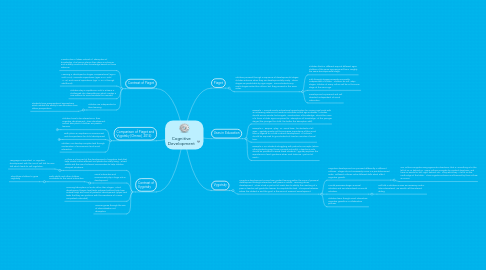
1. Contrast of Piaget
1.1. Construction of ideas instead of absorption of knowledge. The learner places their ideas in schemas and actively constructs their knowledge based on these schemas
1.2. Learning is developed in stages: Preoperational (age 2 until 6 or7), Concrete Operations (ages 6 or 7 until 11-12), and Formal Operations (age 11 or 12 through adulthood)
1.3. Children stay in equilibrium until a schema is challenged into disequilibrium which creates a new schema to accommodate the new skill
1.4. Children are independent in their learning.
1.4.1. Students have preoperational egocentrism which inhibits the ability to see situations from others perspectives
2. Comparison of Piaget and Vygotsky (Omrod, 2014)
2.1. Children have to be interactive in their cognitive development. Their development cannot take place if children are passive learners
2.1.1. Project specifications
2.1.2. End User requirements
2.1.3. Action points sign-off
2.2. Both place an emphasis on environment and its importance for child development
2.2.1. Define actions as necessary
2.3. Children can develop complex task through combination of environment and social interaction
3. Contrast of Vygotsky
3.1. Culture is a key part of the development of cognitive tools that help create a more efficient and productive daily living. Valued adults and the use of informal conversation to help children interpret situations
3.1.1. Language is important in cognitive development with the use of self talk to inner talk which leads to self regulation.
3.2. Social interaction and environment play a large role in development
3.2.1. Both adults and other children contribute to this social interaction.
3.2.1.1. Play allows children to grow cognitivly
3.3. Learning takes place in levels rather than stages: Actual development (upper level tasks achieved without help from outside help) and Level of potential development (upper limit tasks that they can perform with the assistance of a more competent individual)
3.4. Learner grows through the use of internalization not absorption
4. Piaget
4.1. Children proceed through a sequence of developmental stages, children advance when they are developmentally ready. These stages are predictable by age ranges. Some students may reach stages earlier than others, but they proceed in the same order.
4.1.1. Children think in different ways at different ages, children of the same age range will be in roughly the same developmental stage.
4.1.2. Path through stages proceeds universally, independent of culture. Children do not "skip" stages, children of every culture will be in the same stage at the same age.
4.1.3. Development is personal and self directed, independent of social interaction.
5. Uses in Education
5.1. Example 1: Provide similar educational opportunities for varying age levels with an increasing reliance on hands-on activities as that age increases. Activities should remain similar, but Piaget's "construction of knowledge" should be more of a focus at older ages compared to "absorption of knowledge" at the younger stages (the younger the child, the better the absorption skill).
5.2. Example 2: Require "play" or "social time" for students of all ages. Vygotsky points out the immense importance of this social time in regards to a child's natural development. All schools should be required to give students at least 30 minutes of social time.
5.3. Example 3: For students struggling with particular concepts (where other students grasp these concepts naturally), a teacher's aide should be provided to assist these students. Vygotsky explains the importance of such guidance when such tasks are "just out of reach".
6. Vygotsky
6.1. Cognitive development comes from guided learning within the zone of proximal development through interaction with peers or adults. Learning drives development. When a task is just out of reach due to ability, the coaching of a peer or teacher will guide the learner to complete the task. The space between where the student is and the goal, is the Zone of Proximal Development.
6.1.1. Cognitive development can proceed differently in different cultures. Stages do not necessarily move in a pre-determined order. Different cultures value different skills which affect cognitive growth.
6.1.1.1. Our culture navigates using egocentric directions, that is, something is to the left of us, or behind us. Some cultures navigate by cardinal directions, and have no words for left, right, behind, etc. They would say "I left it on the north edge of the table" Their cognitive schema is influenced by their culture, as is ours.
6.1.2. Mental processes begin as social activities and are internalized as mental activities.
6.1.2.1. Self talk in children is seen as necessary, and is later internalized. We would call this internal dialog.
6.1.3. Children learn though social interaction, cognitive growth is a collaborative process.
